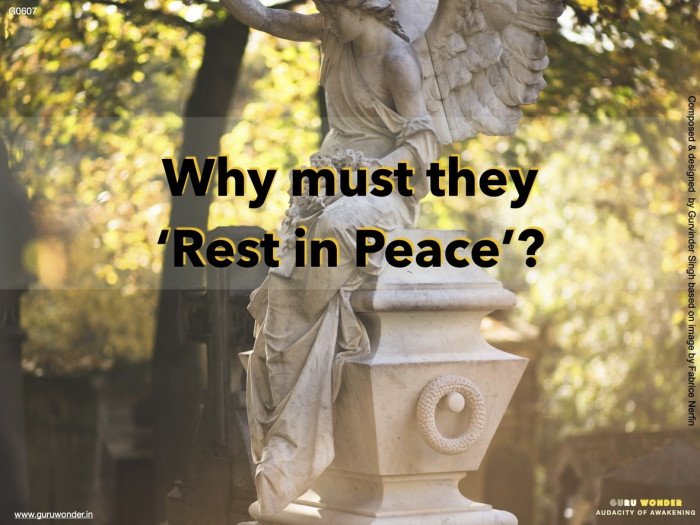We often just imbibe aspects, of the dominant culture, its values, language and beliefs without even realising it. When we delve deeper, we can be fascinated by what we learn about different cultures, languages, philosophies, religions etc.
A recurring doubt, why when offering condolences on the loss of someone do they say 'May his soul Rest in Peace' ?
Raised as a Sikh (the Guru's disciple in search of truth) the concept of 'Rest in Peace' (RIP) from the Latin 'Requiescat in pace', appeared alien. I wondered about the origins and the meaning of this prayer.
Whether one accepts it or not, the language, thoughts and many practices in the modern world of today are influenced by Christianity the dominant culture.
Much of Christian practice, such as the roots of this prayer lies in the Old Testament from which emerge the Abrahamical religions of Judaism, Christianity and Islam.
They believe that God has created humans in His likeness and thus they are privileged and special amongst all life even other humans in the Universe.
Abrahamical religions are linear cultures, in the sense everything is finite. Life has a certain beginning and a definitive end.
The death is the end of the road, and an individual's body reunites with the soul and goes to heaven or hell on Judgement Day.
No one knows when Jesus will come, so while waiting, must 'Rest in Peace' (R.I.P) until then. That is why, they bury the dead. If they can afford, it their dead bodies will be placed in ornate coffins, and buried in a beautiful place. At least they will be in a nice place until Judgement Day, after all, there is no telling how long the wait might be.
On the other hand we have Eastern philosophy of Hinduism and Sikhism with their roots in Sanatana Dharma, which believe all of Creation is One. Each being, human, animal, plant fish, trees, etc are just different facets of that One. This One, is Creation and is called 'Paramatman', the One universal omnipresent, formless indestructible energy. Energy, as we know, which cannot be created nor destroyed, only it changes its form.
Sanatana Dharma suggests everything is circular.
People and creatures do not die, just their bodies perish, because the body is made up of the 5 elements of earth, air, water, fire, and space. The indestructible life giving energy within the body and source of life which we call as 'consciousness' known as 'Atman' simply migrates to a new body.
That new body we obtain in which will dwell the Atman and the starting life of the new journey depends on our Karma. Meaning, whatever happens are the consequences of our actions and our Karma will determine how and where we will be reincarnated (as we sow, so shall we reap over many lifetimes).
'Atman' in Sanatana Dharma is different from the Abrahamical belief of soul. Sanatana Dharma indicates that each Atman is just a part of Paramatman (could loosely be interpreted as universal soul or God) with which all are interconnected in turn with each and every other Atman in the entire Universe.
We are the Universe so as to speak and that Universe is not a human like God but Universal energy manifesting itself in infinite forms.
As per Sanatana Dharma, death as we know it is the perishing of that body (Deh-anth) but not of the Atman. Upon death, Atman the life source energy leaves the body. This dead body, becomes just an empty shell. This shell, this decaying body, for health and sanitation purposes must be disposed off as efficiently and quickly as possible. Though burial is sometimes practiced in Sanatana Dharma, the preferred way is to cremate the body.
This is why to offer the condolence of 'May the soul rest in peace' to a Hindu, Sikh, Buddhist or Jain is really inappropriate. They are not waiting for judgement day. For them each day, in fact each moment is judgement time.
What should one say in place of R.I.P. when offering condolences to a Hindu or a Sikh?
I do not know. I am trying to find out. I am sure one of my readers will enlighten me.
~ Gurvinder Singh
June 2020








